“I want my face to get out there. I want to make Asian Americans proud,” declared Awkwafina in Bad Rap. The 2016 crowdfunded documentary, which premiered at the Tribeca Film Festival, is about four Asian American rappers at varying points in their careers having a similar goal of making it mainstream. At the time, Awkwafina had a popular YouTube rap song, ‘My Vag’, and a debut album titled Yellow Ranger, but only a select group knew who the diminutive rapper, actress and comedian was.
Little did anyone guess that, two years later, Awkwafina would land the role of Goh Peik Lin in the box office hit Crazy Rich Asians. For the first time since 1993’s The Joy Luck Club, the movie featured an all-Asian cast and representation was front and centre in the narrative. In her role as best friend to lead character Rachel Chu (played by Constance Wu), Awkwafina displayed a marvellous combination of wit and intelligence. She was superb in transforming into Goh, fitting right into a life of wealth and outlandish outfits, coupled with a hilarious gait and her own brand of humour—“Bok bok, bitch!” Her comedic timing was impeccable. Awkwafina was a well-loved and brilliant sidekick, one who made audiences around the world pause and dig deeper to find out more about this rising star.
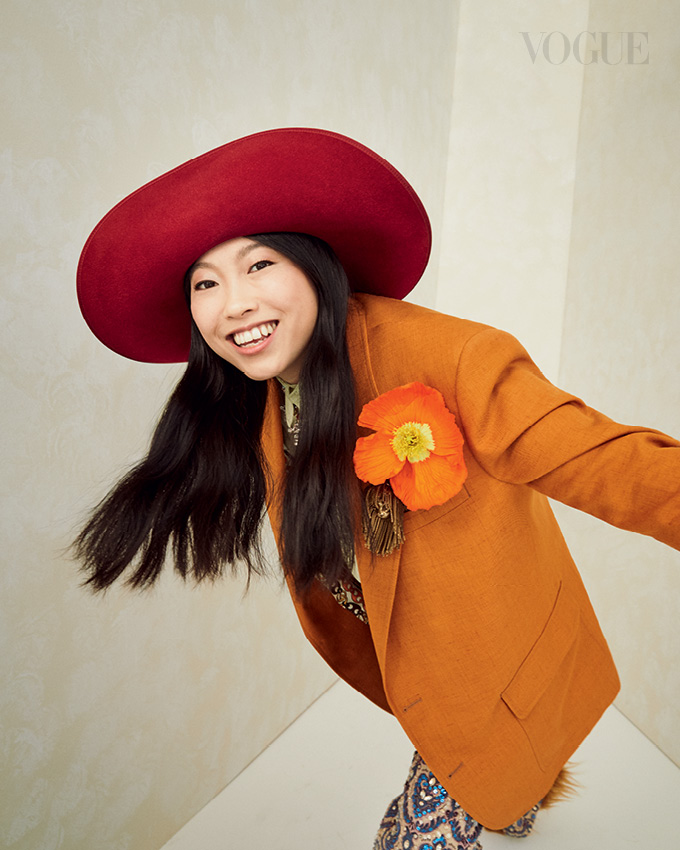
Born Nora Lum to a Chinese American father and Korean American mother and raised in Queens, New York, she shuttled between her father’s and grandparents’ houses after her mother passed away when she was four. She divulges that she grew up quickly. “It made me a tough city kid who saw the world differently,” she tells me over the phone. It is 5pm in New York and she is on her way home after her cover shoot for this issue. “Growing up in New York teaches you a lot of things about reality.”
As for her stage name, she often reveals in interviews that she was an awkward child and not your “typical girl”. The moniker was inspired by that. “Awkwafina is a voice inside me and also an invention of mine,” the 33-year-old explains. “Awkwafina is always going to be a part of myself. I can’t say if it’s completely separate from Nora because they are both a part of me.”Her natural penchant for making people laugh goes all the way back to her early childhood. “I had this intense urge since I was a very little kid to make people laugh. I don’t want to make people laugh at their expense; I like to create joy. That was always a prerogative of mine as a kid.”

Hardly of grave importance to most young children, perhaps it is this genuine desire to elicit delight that makes her staggeringly down-to-earth despite a meteoric rise to stardom. She is thoughtful and deliberate in response, reminding me more than once that she hasn’t forgotten her life before fame. Our half-hour conversation, while peppered with light-hearted anecdotes and laughter, also showcased a serious side to the actress as we waded through her reality.
“Sometimes, I do feel pain, sadness and I do feel down,” she says slowly. “I feel like people always expect laughter from me but there is another side that is more introspective and anxiety-ridden.
“I feel like people always expect laughter from me but there is another side that is more introspective and anxiety-ridden”
“I’ve been paying attention to my serious side coming out a lot more as I get older. There’s always been an air of anxiety about me—perhaps an Asian trait instilled in me?” Awkwafina continues. Her other Asian trait, she says, is thriving on being busy, something her grandmother has hammered into her since she was a little girl. She laughs when I tell her my father is the same and refuses to retire for fear of being bored. “That’s so true. I like to complain about how hard it is and how constant it is, but when I’m off for long enough, I question if I’ll ever work again and then become depressed.”
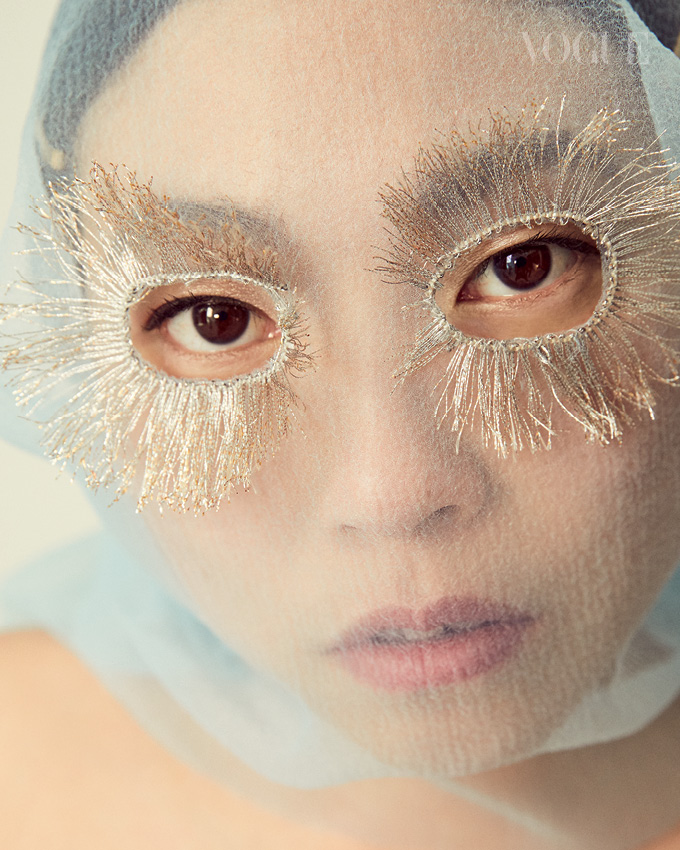
Awkwafina’s most memorable performance after Crazy Rich Asians was in independent comedy-drama The Farewell, where she played the lead role Billi. The film, which is a heartfelt celebration of family, sees Billi’s entire family schedule a gathering to visit their beloved matriarch who has been given weeks to live—without telling her the truth of her diagnosis.
The Farewell gave audiences a glimpse into Awkwafina’s contemplative side. It was a movie that resounded with her personal life and was an ode to her 85-year-old grandmother, whom she calls her best friend, greatest inspiration and “formative of the fibre of my being”.
“My grandma implanted in me the confidence I had, believing in the things I used to get made fun of. She always told me to embrace my weirdness,” she enthuses. “In a world that tells you that Asian women should be a certain way, she showed me that she was the financial neck of my family and held us all together. She wasn’t meek or shy; she was loud and confident and wanted to make people laugh just like me.”The serendipitous clash of worlds paid off. Awkwafina clinched a Golden Globe award for best actress, winning in the musical or comedy category for The Farewell. It was well-deserved, yet she doesn’t yet feel that she’s made it. “I don’t feel like I’m an actress who has made it to the point where I want to be. Everything that I do right now—whether it’s producing, writing or when I’m on set—there’s an urge to want to learn. I’m not good enough that I have to stop learning.”
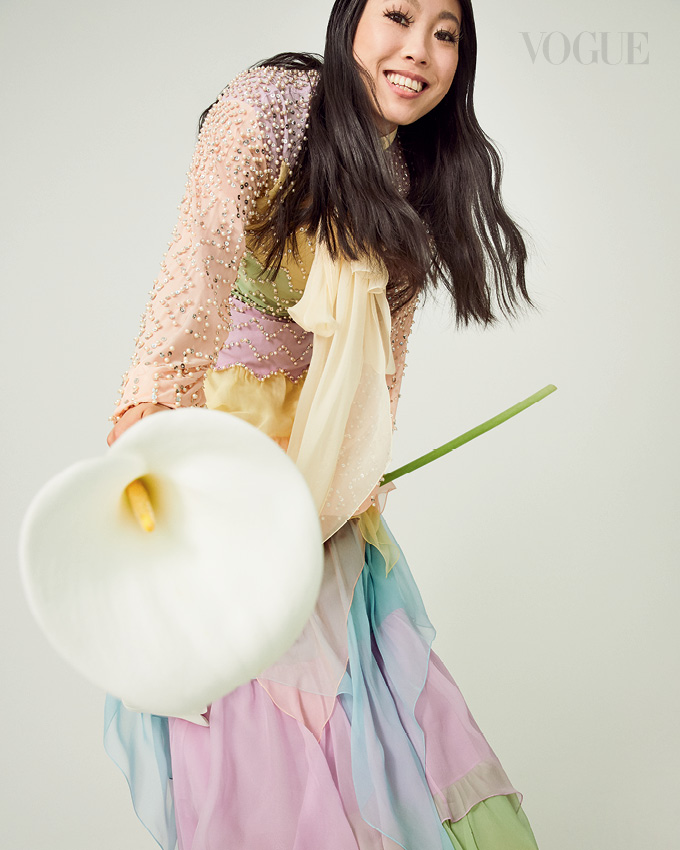
For Awkwafina, who voiced the dragon Sisu in Disney’s Raya and the Last Dragon, her self-effacing demeanour also comes with a significant serving of imposter syndrome. “I’ve always dealt with a big deal of imposter syndrome because of the speed at which my career happened—like it was overnight. But there has to be a point where I stop and tell myself that I’ve worked really hard for this. I put blood, sweat and tears in this. You have to have a degree of doubt, but you also need to have a degree of confidence to know that you’ve worked hard.”
“I’ve always dealt with a big deal of imposter syndrome because of the speed at which my career happened—like it was overnight. But there has to be a point where I stop and tell myself that I’ve worked really hard for this”
And that she has. Awkwafina knew her days were meant to be in the entertainment industry when she would skip meals and lose sleep over her work because she was working so hard she would forget to eat. There’s an unadulterated excitement in her voice when she recalls starting out in showbiz and how she never thought passion would drive her this far.
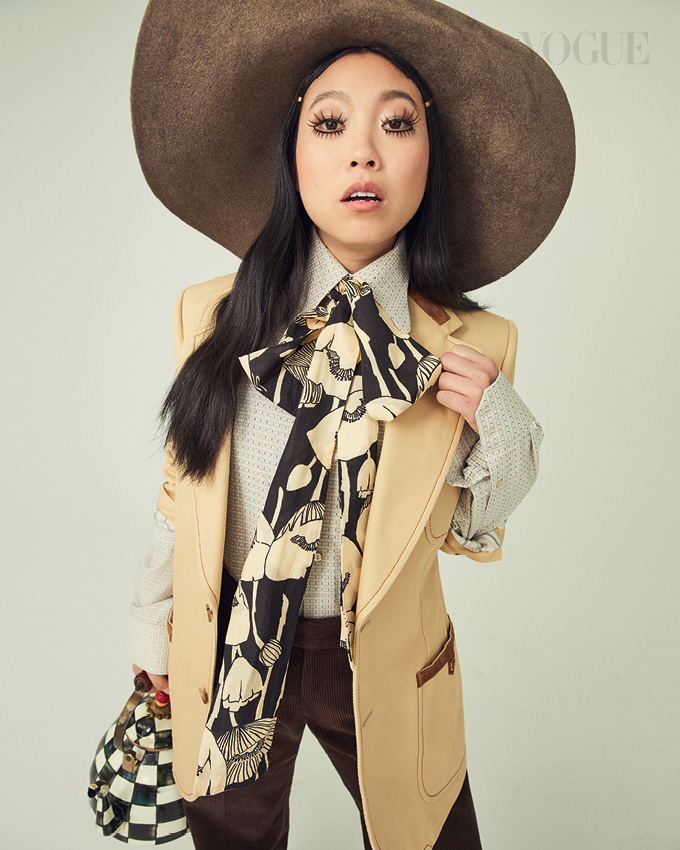
Her next gig? Marvel’s Shang-Chi and the Legend of the Ten Rings, which is set for release in early September. While she isn’t allowed to reveal too many details of the superhero film, she believes the movie will broaden what we know about Asian representation—alongside a star-studded cast that also features Simu Liu, Tony Leung, Fala Chen, Ronny Chieng and Michelle Yeoh. “The beauty of this is that Asian representation continues to grow. And what I’ve seen of the movie is that this is a completely different perspective that I haven’t even seen. It’s going to be really great.”
On that note, Awkwafina believes that with Asian hate crime rising in prevalence in America, awareness that discrimination exists is the first step in the right direction.
“I’m absolutely horrified and sickened by what I’ve seen in the news, but it’s not necessarily something that surprises me. All Asian Americans can agree that we have all faced some level of discrimination in this country. We need to also find a level of unity within other POC [person of colour] groups, come together and acknowledge that these things exist.”
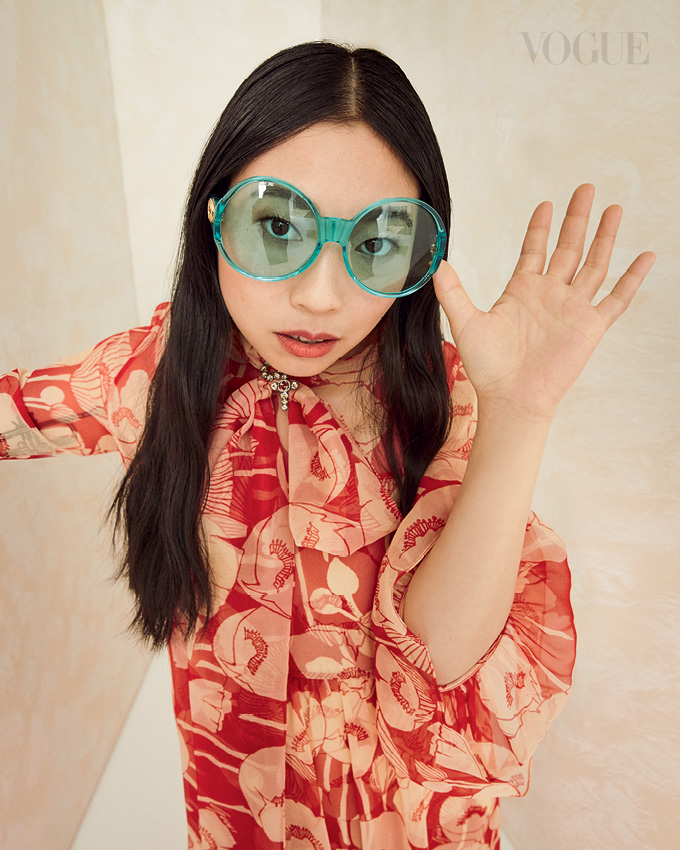
Everyone will remember Awkwafina’s first scene in Crazy Rich Asians, when she welcomes Chu into her ostentatiously gilded home, running out to the driveway with her arms flailing. Most of us will also remember her fabulous outfit—a Stella McCartney dog-patterned silk pyjama set that was as loud as her character’s personality.
In real life, her personal style is far less flamboyant. She admits that growing up a tomboy, she would much rather wear a “giant, fluffy cake-like thing than a black dress”, but she has also embraced the beauty of fashion as one that doesn’t always have to make sense. “I’m getting more comfortable in my own skin and I feel like I can now use fashion as an expression of myself.”
Building on that self-expression, Awkwafina is currently a Friend of Gucci and one of seven major celebrities fronting the house’s new Beloved campaign, shot by Harmony Korine. Her relationship with the Italian luxury fashion house is an organic one as she was “always thirsty for Gucci and the eccentricity of the brand”. While she rarely drops brand names, she says her first big purchase was “literally a Gucci handbag”.

Five years after Bad Rap, Awkwafina has indeed made Asian Americans proud. It’s in the way she backs representation, the roles she plays in movies, her positive work ethic and respectful interactions with the people around her. She maintains there’s nothing she would have had differently.
“Everything that has happened to me, bad or good, taught me something and puts me in the position that I am now—with patience, non-arrogance, all of those things. I remember what it was like to broke, to be made fun of and treated like nothing. I remember those days and so those lessons always play into my life now. I’m grateful for them.”
“I remember what it was like to broke, to be made fun of and treated like nothing”
Awkwafina pauses for a moment, before continuing with a short laugh. “My dream is not to worry so much,” she muses cryptically. “I’d like to be happy for the things that aren’t immediate and for the people in my life. I would love to not always be chasing something and to be satisfied to a degree that makes me feel secure.”
Editor-in-chief: Norman Tan
Photographer: Yelena Yemchuk
Fashion: Daniela Paudice
Hair: Jenny Kim
Make-up: Benjamin Puckley using Clé de Peau Beauté
Manicure: Ada Yeung
Fashion production: Michael McDowell
Stylist’s assistant: Alex Picon
Producer: Bo Zhang
Casting: Jill Demling
Set design: Ian Salter





